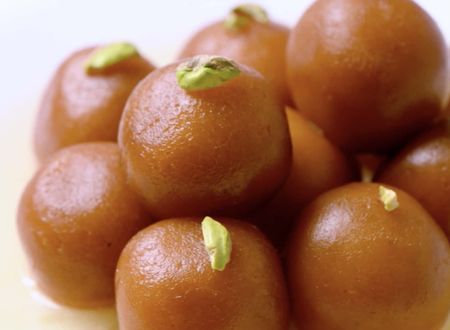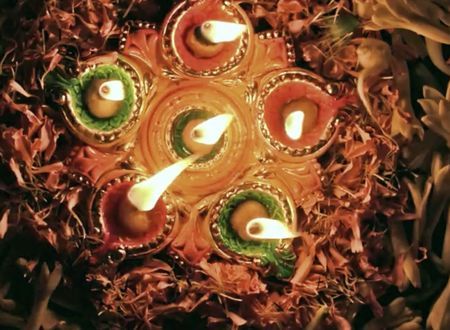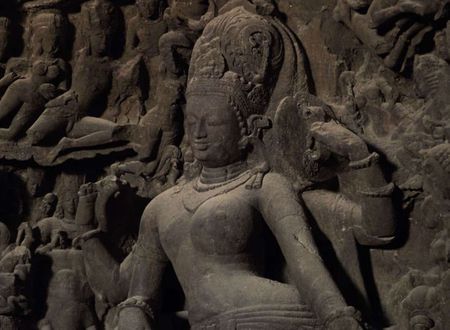First and foremost I offer my obeisance to Lord Krishna, who in Srimad Bhagavad Gita declared that “I am the Yajna-Purusha.” Then, I offer my entire being at the lotus feet of my beloved master, Om Swami for bringing the glory of Vedic times back to us and making it accessible for ignorant people like me, and for guiding us ever in the spiritual journey.
I have written this post, especially for my sweetest sister, Sonali Om, as she enquired about the significance of Yajna but I thought I will share it with all of you so that others can also benefit. This post by no means is a description of the complete glory of Divine Yajna as who can describe the glory of the Lord but is a humble attempt to share a few of the inner meanings that have come to me. Although there are many types of Yajna, the focus here is Dravya Yajna.
Dravya Yajna :
The word Yajna has come from the root ‘yaj’ which means to worship, adore, or praise. Yajna also means an offering or sacrifice. So, the complete meaning of Yajna is to revere or praise the various elements of the divine by offering things that give us pleasure and are dear to us. Yajna has three important components – Agni( fire), soma (various food items that give us pleasure), and Vayu (air) that helps us in the process of pouring soma into Agni. The last thing to understand is the havan kund itself. By understanding the inner meaning of these four elements, we can begin the gain some insight on the process of divine Yajna.
Agni:
Who can describe the glory of Agni, a mere mortal definitely can not even describe the glory of Agni that has been extolled and always invoked first in the Vedas but I will try.
Agni means ‘fire.’ This fire refers to the aspiring flame that rises from our inner most being; again, ‘Agni’ also refers to the fire god himself. Like a flame, this desire consummates all other desires. When rumi wrote “A thousand half-loves must be forsaken to take one whole heart home,” it represents that one whole and deep urge within you that makes you forsake a thousand other desires. When a student burns the night lamp to study for a competitive exam, when a lover leaves everything to get married, when scientists forsake getting married so that they can focus on their research, and when we leaves all to find its true nature, this force of will-power is represented by fire.
Agni means not only their innermost desire, Agni is the presiding deity of ‘Agni tattva,’ the heat element in us. This heat element is responsible for all the desires, for the power of will is born of this subtle tattva, without this tattva, it is impossible to will.
So, there is a divine element, Cosmic Agni, the power of cosmic will, and there is a spark of that divine element within me, that allows me to will so that I can transform myself to achieve what I most ardently desire. By igniting Agni, I intend to connect my individual will to the cosmic will and bring it in harmony so that I only ‘Will’ what is aligned with the ‘Will of the Cosmic divine Person.’
This Cosmic will leads us to a cosmic being. Hence, Agni is also named asa messenger of Gods that takes us higher. In this sense, one can also treat his own personal master as inner Agni in his/her life. Igniting Agni, hence in yajna is equivalent to invoking your own Guru.
Many sages also claims that as a practice, looking at fire or coming in close contact with fire for a long time balances the solar plexus as well.
Soma:
Soma, literally means shining, or bright. It is associated with the moon. Moon does not have its own light, yet it appears bright and shining. We all would have heard the soma drink that gods drink. Soma is the wine of delight, that which gives us pleasure, ananda is soma. It represents all the activities that gives us pleasure in life.
In Yajna, we offer various food items into Agni, all those food items represents the pleasures of life that we are ready to sacrifice into Agni, to our will. We can look it at as offering those pleasures that keeps us in the lower states of consciousness into Agni, our own power of will that will leads us to higher states of consciousness.
Again, a student sacrificing sleep, a soldier sacrificing his life, a scientist or doctor sacrificing his time, or a sadhaka sacrifices his lower urges represents the soma of life that we all pour into Agni.
Vayu:
Vayu literally ‘air,’ but it is much more that air, it represents our pranic vayu as well the cosmic Prana that sustains this universe. To sacrifice our lower tendencies and pleasures into Agni, for a higher principle at will can not be done by a person until he is physically, mentally, and emotionally healthy. The principle of vitality is represented by Vayu.
So, there is the life principle that I can get in touch within me and the same life principle is observed in the cosmos, in the intended I again to connect with the cosmic Vayu, ‘the lord of vital energies’ so that he sustain these individual vital energies so that I can offer Soma into Agni.
Chanting Vedic mantras mentally is a powerful way to energise our ten vital energies and chanting those mantras loudly, usually in a gathering, energizes the environment around. Vayu, is always said to be a companion with Agni in Vedas. So these chants, when done with proper sacrifice of lower pleasures into Agni, Cosmic Will, help us take our message to the cosmic person and to the deity of your choice so that the deity of your choice manifests into your daily life. What does it mean that a deity of your choice has manifested into your daily lives? It means that you become more and more like your own ishta.
Havan Kund:
This is the last and most important part of the vedic Yajna. The havan kund is a place where all the fire offerings are made. This havan kund represents the field of action. The place where you want the transformation to happen. For a sadhak this havan kund is his own individual being, where the fire is ignited and will is activated to connect with cosmic will, then all his lower pleasures like sleeping late, eating unhealthy, gossiping, speaking harsh words etc. are sacrificed into this cosmic Agni within. This will is strengthened by chanting vedic affirmation and mantras that together helps an individual connect to the deity or cosmic person for the spiritual upliftment.
All the mistakes are mine, the inspiration to write this post comes from the question asked by Sonali Di, and the wisdom to write this has come from my Guru, and the Will to write is from Shree Hari Alone!!!
All Glories to Swamiji alone!!!









Comments & Discussion
28 COMMENTS
Please login to read members' comments and participate in the discussion.